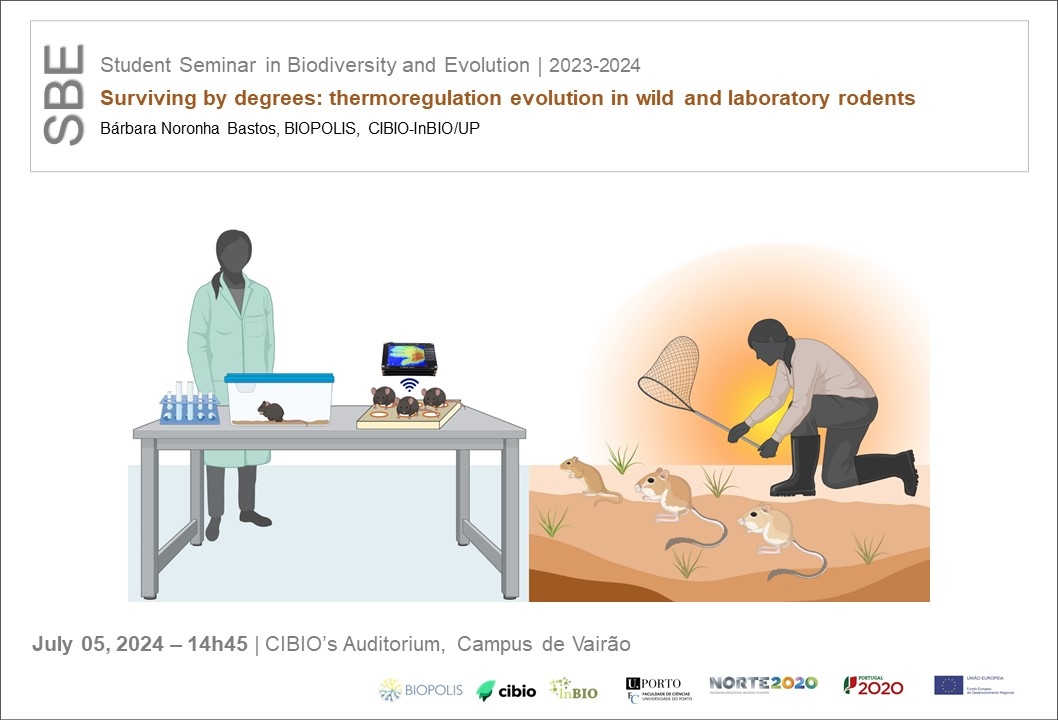Surviving by degrees: thermoregulation evolution in wild and laboratory rodents
Event
STUDENT SEMINAR IN BIODIVERSITY AND EVOLUTION
July 05th, 2024
Bárbara Noronha Bastos, BIOPOLIS, CIBIO-InBIO/UP | 14h45 | CIBIO, Campus de Vairão

STUDENT SEMINAR IN BIODIVERSITY AND EVOLUTION
Understanding the evolutionary mechanisms of thermoregulation in mammals is crucial for deciphering their adaptation to environmental changes. Using integrative research, we first decoded the molecular mechanisms of thermoregulation in 21 rodents, complying 52 genes of three different strategies (homeothermy, daily heterothermy and hibernation). We examined their genetic homology, signs of positive selection, protein adaptations, and protein-protein interaction networks associated with protein modifications. We observed conservation of thermoregulatory genes, with daily heterotherms and hibernators showing higher selection signs and faster adapting physiological networks, compared to homeotherms, highlighting their ability to cope with dynamic environmental challenges. Second, to understand the molecular control of thermoregulation, we studied wild rodent species, focusing on African heterotherms. These live in unpredictable, harsh, and sometimes desert conditions, where species usually benefit from having fast adaptation mechanisms to survive. We looked at the particularities of their proteins to see how their ability to cope with dynamic environments evolved. Third, we are studying how the expression and physiology of these genes varies from birth to early adulthood in laboratory mice (Mus musculus, C57BL/6J) in a controlled environment. Mice pups are born poikilothermic, relying on environment to thermoregulate, achieving endothermy and then being able to express facultative heterothermy as adults. We aimed to identify the poikilothermy-endothermy transition point and the genetic underpinnings of this process. Using an innovative contactless, wireless, stress-reducing approach, we monitored superficial and subcutaneous body temperature fluctuations. We found that endothermy sets before weaning age in all 11 litters. Integrating these findings provides a comprehensive understanding of the evolutionary mechanisms driving thermoregulation in mammals, being informative for conservation efforts regarding ongoing climate changes.
Bárbara Noronha Bastos is a molecular and cell biologist interested in evolutionary processes, genetics and molecular networks of rodent physiology. Her goal is to study the evolution of molecular mechanisms that are driving physiological processes by combining diverse scientific fields and methodologies. Like bioinformatics, working with genomics and transcriptomics, alternative splicing, differential gene expression, gene-gene/protein-protein networks and positive selection; protein science, working with structures, protein-protein/ligand evolution; and behavioural, physiological and thermography analyses in rodents in lab/field conditions. She graduated in Animal Science and Technology (BSc) and did research in the influence of turbot nutrition on its body composition. Then she graduated in Molecular and Cell Biology (MSc), focusing on Regucalcin gene evolution and function using Drosophila spp. at IBMC, i3S. During her BSc, in 2016 she did an Erasmus+ at Czech University of Life Sciences, Prague. Currently, she is a 4th year PhD student at the Sciences Faculty of Porto, in the BIODIV programme doing research on Daily heterothermy in arid adapted rodents, its genetic background and climatic relevance, being supervised by Dr. Zbyszek Boratýnski within the Biodiversity of Deserts and Arid Regions group of BIOPOLIS/CIBIO-InBIO, and by Dr. Katja Nowick from the Human Biology group at the Faculty of Zoology of the Freie Universität, Berlin. She is also collaborating with Dr. Clemens Kuepper from the Max Planck Institute, exploring the biology and evolutionary mechanisms of aggression in P. calidrix; and with the Institute for Research and Innovation in Health (I3S) where she is investigating the ontogenetics of the physiological onset of homeothermy in laboratory mice with Dr. Nuno Franco.
[Host: Zbyszek Boratýnski, Biodiversity of Deserts and Arid Regions - BIODESERTS]
Zoom Link: https://fc-up-pt.zoom.us/j/84429728251
Bárbara Noronha Bastos is a molecular and cell biologist interested in evolutionary processes, genetics and molecular networks of rodent physiology. Her goal is to study the evolution of molecular mechanisms that are driving physiological processes by combining diverse scientific fields and methodologies. Like bioinformatics, working with genomics and transcriptomics, alternative splicing, differential gene expression, gene-gene/protein-protein networks and positive selection; protein science, working with structures, protein-protein/ligand evolution; and behavioural, physiological and thermography analyses in rodents in lab/field conditions. She graduated in Animal Science and Technology (BSc) and did research in the influence of turbot nutrition on its body composition. Then she graduated in Molecular and Cell Biology (MSc), focusing on Regucalcin gene evolution and function using Drosophila spp. at IBMC, i3S. During her BSc, in 2016 she did an Erasmus+ at Czech University of Life Sciences, Prague. Currently, she is a 4th year PhD student at the Sciences Faculty of Porto, in the BIODIV programme doing research on Daily heterothermy in arid adapted rodents, its genetic background and climatic relevance, being supervised by Dr. Zbyszek Boratýnski within the Biodiversity of Deserts and Arid Regions group of BIOPOLIS/CIBIO-InBIO, and by Dr. Katja Nowick from the Human Biology group at the Faculty of Zoology of the Freie Universität, Berlin. She is also collaborating with Dr. Clemens Kuepper from the Max Planck Institute, exploring the biology and evolutionary mechanisms of aggression in P. calidrix; and with the Institute for Research and Innovation in Health (I3S) where she is investigating the ontogenetics of the physiological onset of homeothermy in laboratory mice with Dr. Nuno Franco.
[Host: Zbyszek Boratýnski, Biodiversity of Deserts and Arid Regions - BIODESERTS]
Zoom Link: https://fc-up-pt.zoom.us/j/84429728251
